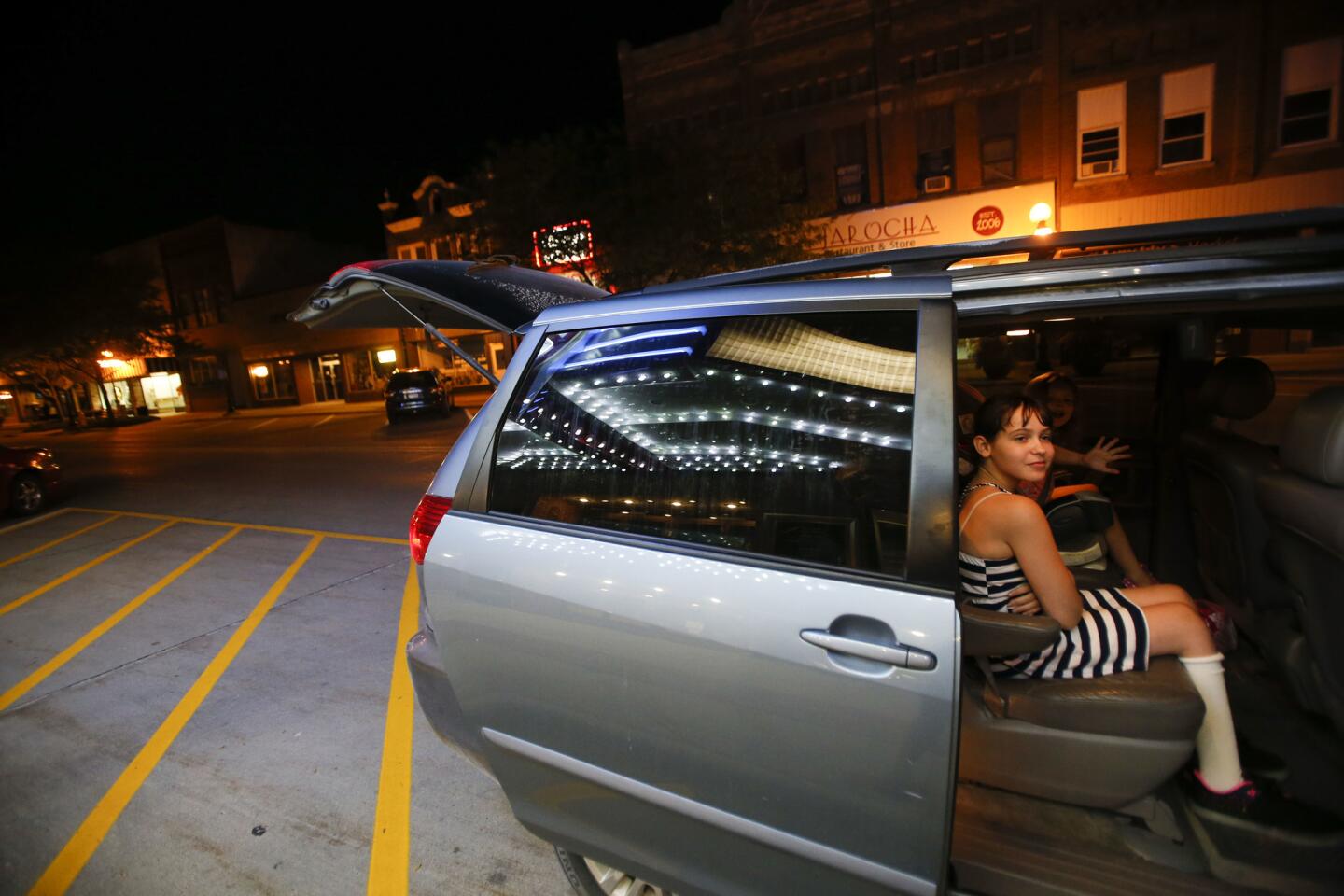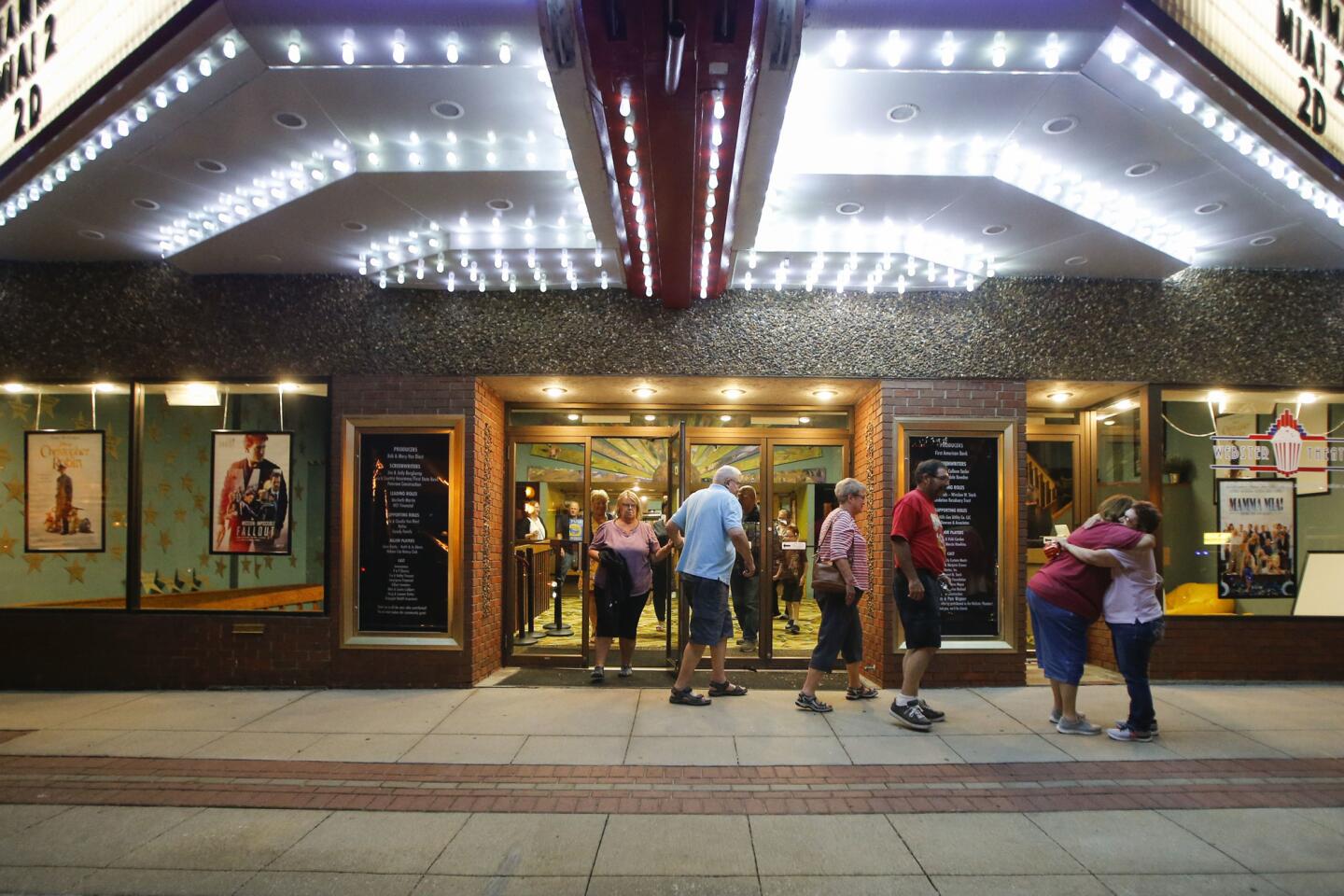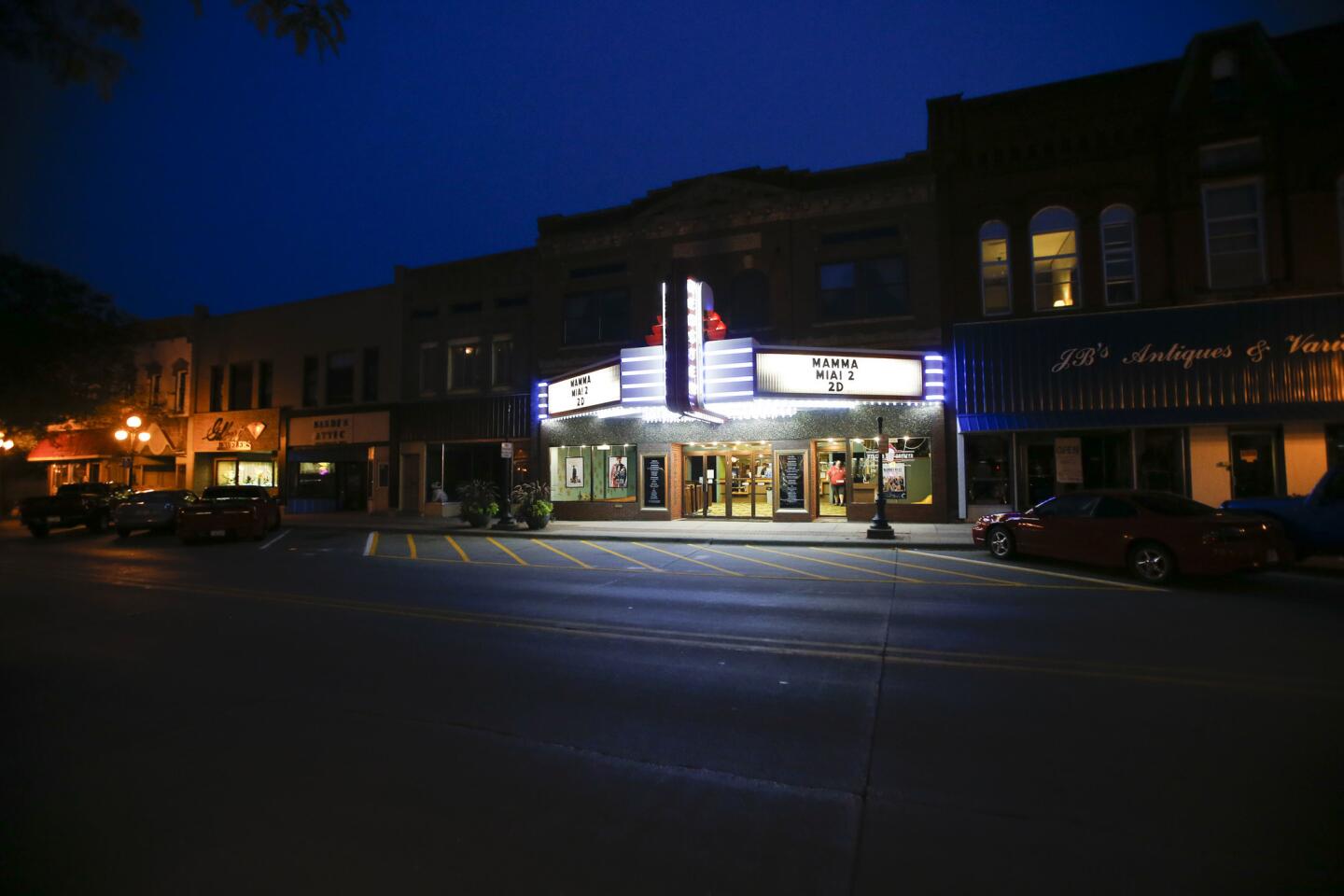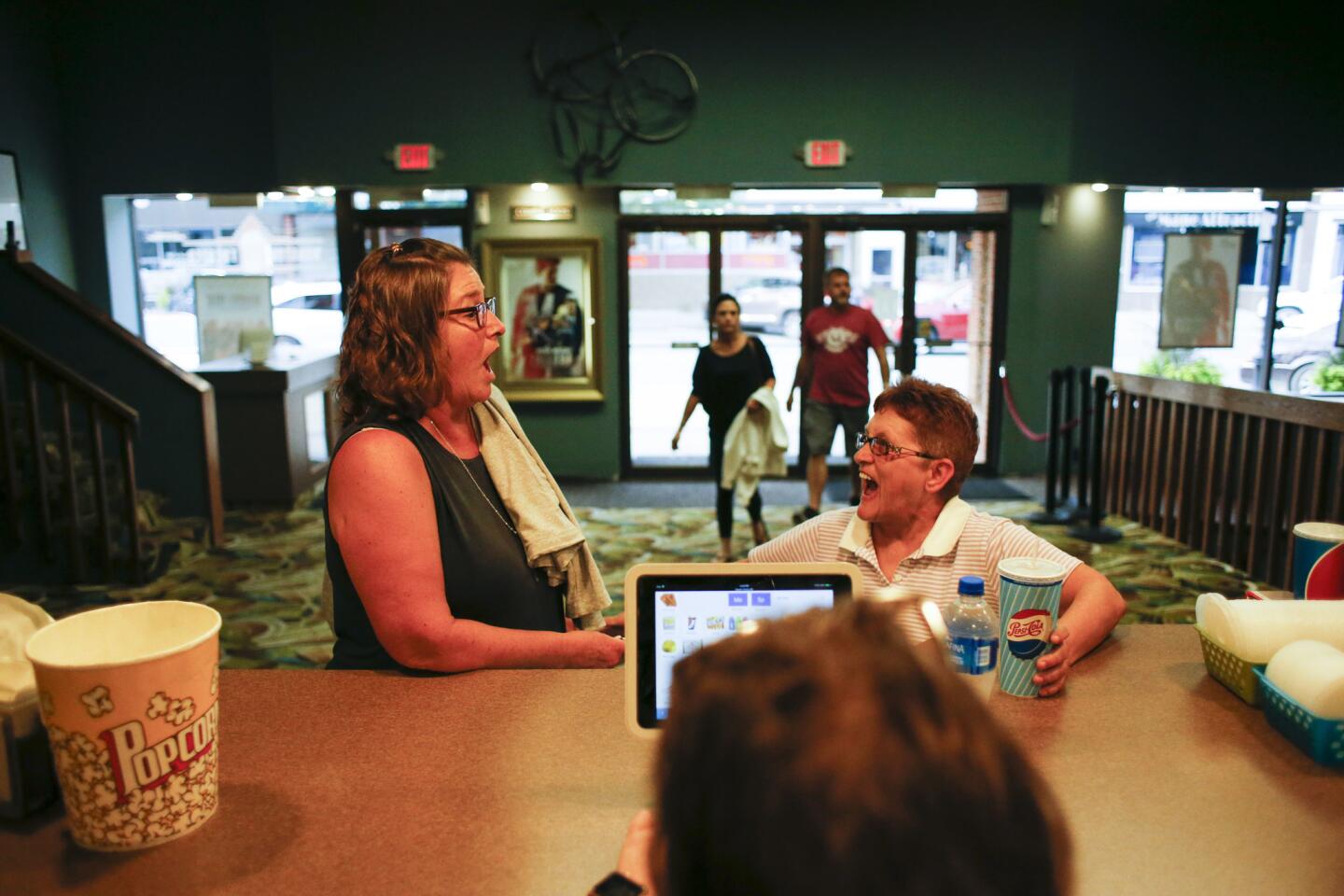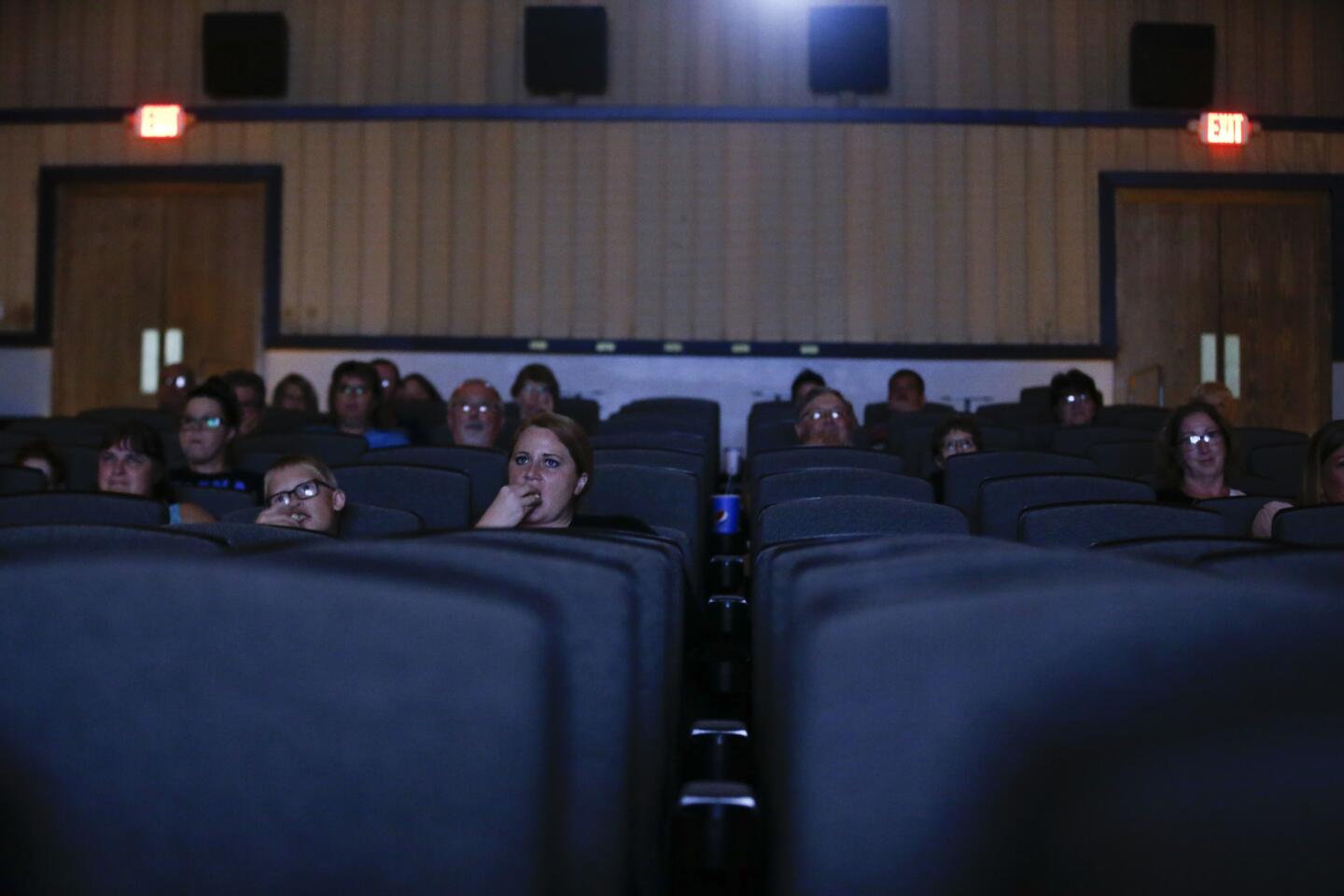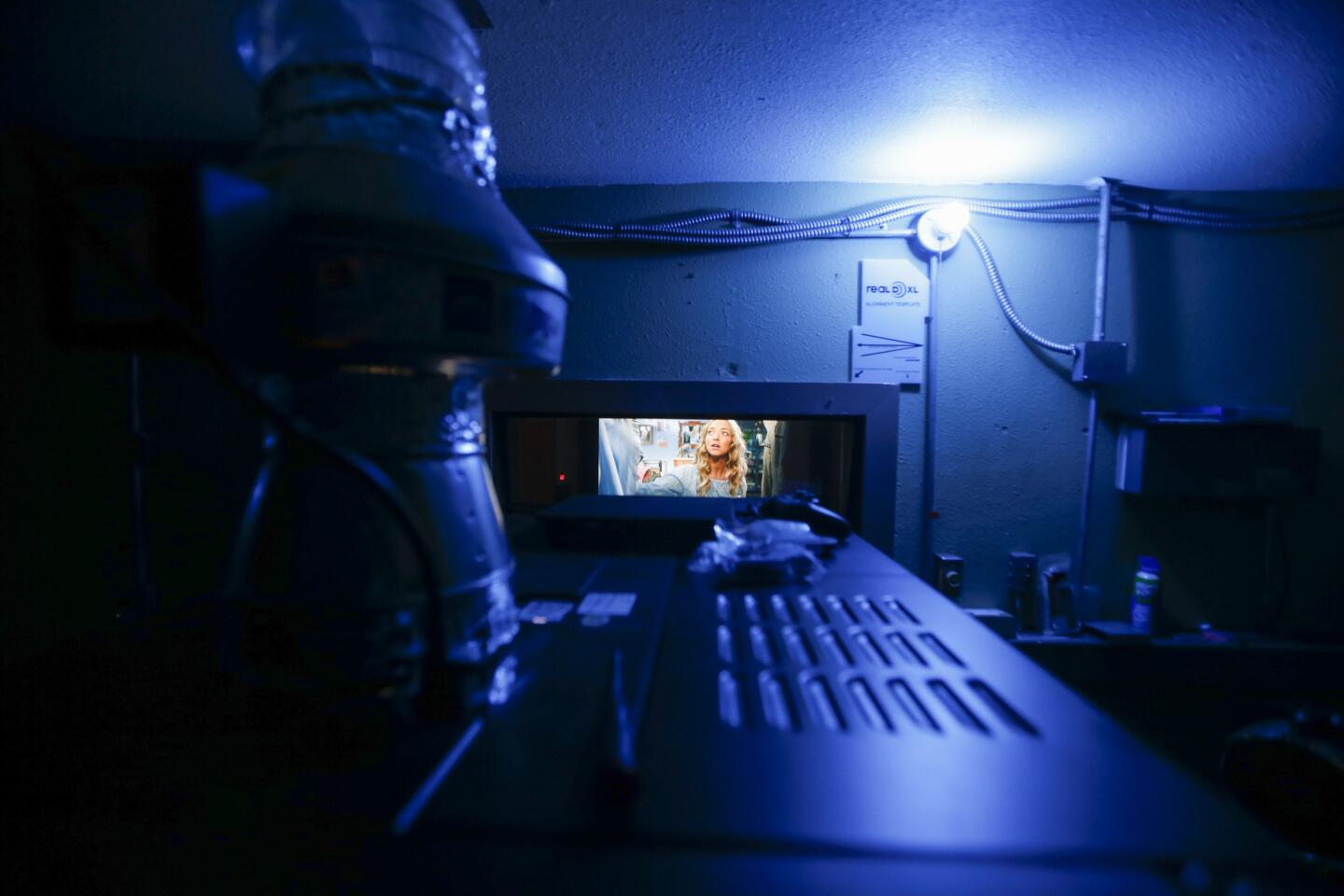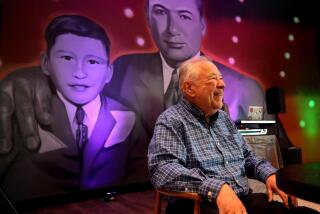Immigration. Technology. Trump. A lot has changed in small-town America. One Iowa town drew the line at its movie theater
- Share via
Reporting from Webster City, Iowa — Percy B. Long wore wingtips and rolled his own cigarettes. He managed the Webster Theater in the days before talkies, when trains ran swift and nights settled over plowed fields that spread as if a dark sea from Fort Dodge to Waterloo.
The Webster brought in the world and kept the town bright until the marquee lights switched off each evening after the last show. It was a piece of America that defined a way of life. But that country and its values are shifting, and this town, like many others, is navigating an era of movies on iPhones, cultural wars, immigration tensions and a presidency that has upended notions of politics and Midwestern civility.
“I was pretty much born and raised in the theater,” said Long’s son, Tom, 89, whose youth was filled with “Tarzan” and “Zorro.” “Will it be in the future what it is today? Who knows.”
Webster City — population about 7,700 — is a miniaturist portrait of a changing nation.
An hour’s drive north of Des Moines, the town, shadowed by grain silos, lost its washing machine factory to Mexico seven years ago. Its predominantly white population is absorbing rising numbers of immigrants, many of them Latinos working in meat plants. And, although nearly 60% of this county voted for President Trump, few speak too loudly in support of the tariff and trade war with Europe and China that could cost Iowa farmers hundreds of millions of dollars.
The theater, with its 206 marquee bulbs and $4 tickets, is a central character in a story that balances tradition against the tug and pressures of today. Movies here are like notches on door jambs; they mark the passage of time.
The American small-town movie house was once an enchanting place of hand-holding and stolen kisses, where films that traced the cultural evolution of a country – from “The Best Years of Our Lives” to “Easy Rider” to “Wall Street” – signified the power Hollywood had on the imaginations of farmers, shopkeepers, mechanics and clothiers spread across Iowa, Kansas, Missouri and other flyover states. Hundreds of theaters shut down over the decades, brought low by the same forces that took away Webster City’s family-owned shoe stores and bakery.
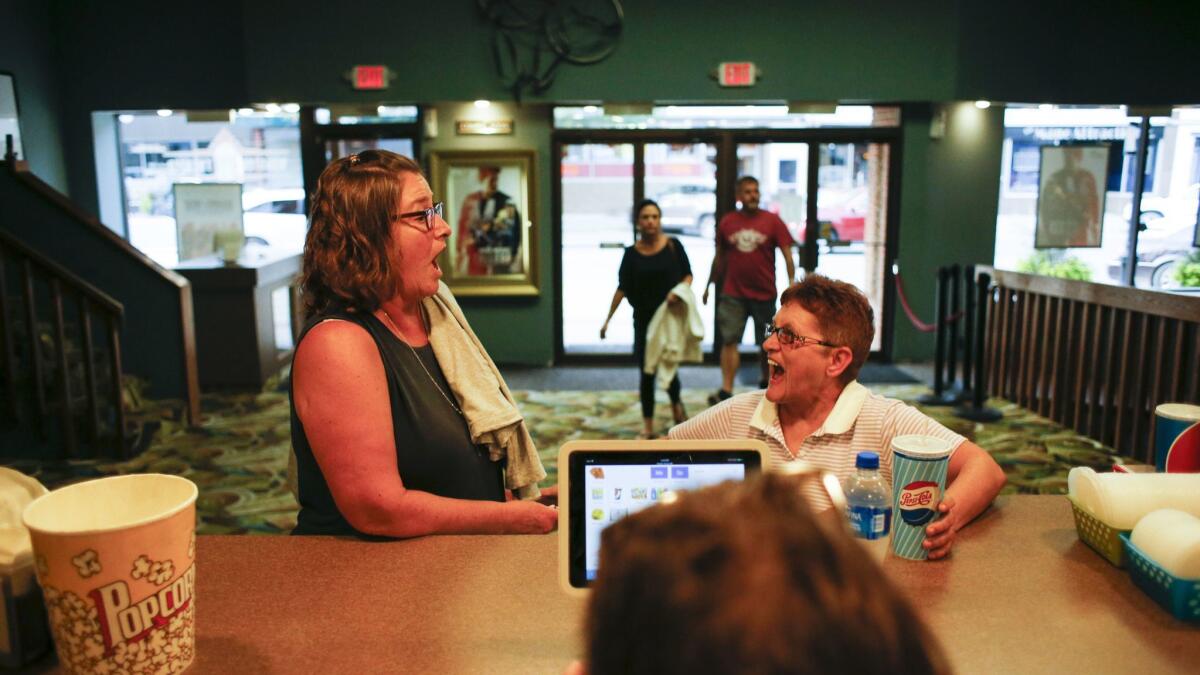
The closing of the Webster in 2013 was a defining moment for Webster City. Built in 1906, the tan-brick theater had been battered by the 2008 recession. When the Electrolux washing machine plant, which at its height employed about 2,200, shuttered and moved jobs to Mexico a few years later, families left too. Storefronts went dark.
It was then that Jeff Pingel, who wore plaid shirts and rode a Harley, decided that the Webster — where Hedy Lamarr once flickered luminous and Dan Aykroyd showed up in 1980 to sell tickets to “The Blues Brothers” — could not be lost. He ordered up a business plan from a high school entrepreneurial class and led a fundraising drive with Kay Ross, who with her husband, Larry, ran a saloon. They created a nonprofit and collected $270,000 to buy and renovate the theater. It reopened in 2014.
“We were so tired of losing,” said Pingel, who worked at Electrolux for 19 years. “It’s funny to draw a line in the sand with a movie theater, but that’s what we did.”
The movie marquee “is the heart of the American downtown,” said Ross, who as a child saw “Bambi” and “A Hard Day’s Night” at the Webster. “Nostalgia helped us raise the money. I never got a donation check without a story. ‘The Anderson boys all worked at the theater.’ ‘I ushered at the Webster one summer.’
“But what keeps it open is that we want it here. Films make an impression on people. And there’s just something about going to a show.”
But the town is not the same as when Percy B. Long managed the Webster, marrying a woman who played piano in the orchestra pit, and his son, Tom, an usher, returned from the Korean War and wed Mary Olthoff, a ticket taker. There are more consignment shops. A drop in births is forcing the hospital to shut down its obstetrics unit. Coaches, who order more online these days, are buying fewer footballs and jerseys from Sports World, which decades ago moved into the old J.C. Penney building.
The unemployment rate is low, but many of the agriculture, meat and service jobs don’t pay the wages and benefits Electrolux did.
“There’s a bit of a renaissance, economically,” said former city manager Daniel Ortiz-Hernandez, who resigned last month to take a similar job in Wasco, Calif. “But we struggle to attract housing developers. It’s hard to get people to come and live in a small town.”
Webster City’s demographics began changing in the 1970s when Moun Thongsouk and his family fled communist Laos and found refuge with a local Methodist church. Laotians now make up roughly 15% of the town’s population; they were followed by more recent immigrants from Mexico, Honduras and Guatemala, who work in local meat factories, accounting for about 25% of the population. Their numbers are likely to increase with the opening of a new hog plant near Eagle Grove.
“We want to grow,” said Laura Jaimes, the Mexican-born manager of Chicago Style, a clothing store across the street from the theater. She and her husband started a family in Chicago two decades ago, and in 2014 moved to Webster City. He works in a factory behind the store; two of her children have jobs at a meat plant. “Most of my customers are Spanish-speaking people. It was hard when we first started. It’s good now.”
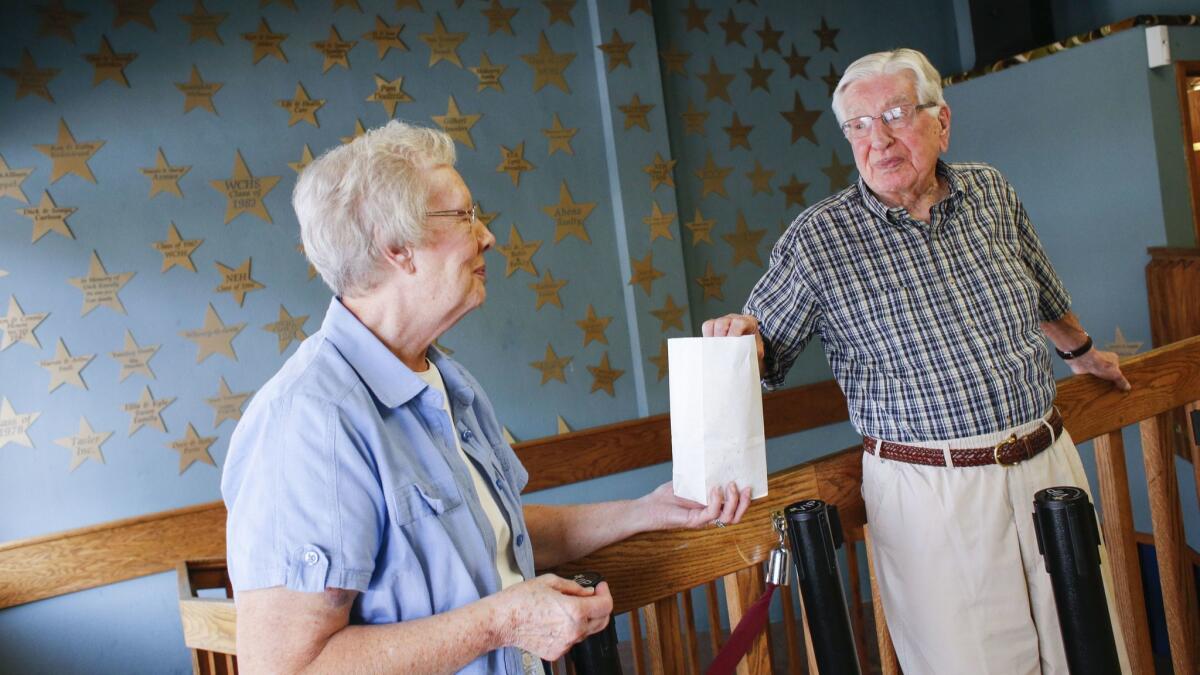
Webster City’s sidewalks are snapshots of two worlds: White-haired retirees head to lunch at the Second Street Emporium, while Latina laborers wearing rubber boots and hair nets stroll past Fuhs Pastry Shop, which has gone out of business, and La Perla Jarocha, where Viviana Sosa stands at the cash register beneath a ceiling dangling with piñatas.
“The theater brought everyone closer together, to get it back running so we wouldn’t lose more of the town,” said Sosa. “But the Latinos here are separated. A lot of downtown events don’t market to us.”
“We tried to do a Hispanic movie night,” said Pingel. “You have to order a Spanish-language version and you don’t know when you get it if it will be subtitled or dubbed. You think it would be easy, but it’s not. We have to try again.”
Conversations over coffee at Whoop-Ti-Doos meandered from immigration — passions around the issue were roused across the state recently when a Mexican immigrant who entered the country illegally was arrested in the slaying of a white University of Iowa student — to any number of topics. Men went on about football, jobs, Democrats ganging up on Trump, garage sales and how “schools have lost their fundamental mission.” One mentioned a “Gunsmoke” rerun “about this bad dude who comes to town,” while another noted the passing of Aretha Franklin and the prospect of a Mexican restaurant opening at the end of the month.
Two tables away, women spoke of a town in transition and lingered on the old days “when you just didn’t end a sentence with a preposition.” One of them took a call on her cellphone: “I don’t have a mailing address to give you. You’re trying to scam an old lady. I’m going to hang up now.”
Thousands of movies have passed through Webster City. People reminisce about “Spartacus,” “Psycho,” “Gone With the Wind,” Gene Autry, Marilyn Monroe and Chris Pratt. Tyler Abens saw “Back to the Future” twice at the Webster. His girlfriend and two best friends worked the concession stand and got him in for free all through high school. Jake Pulis saw “E.T.” when he was 5, and Jerry Kloberdanz saw “Star Wars” at a time, he said, “when there was no internet and no cellphones, and you wondered how did they do that with a lightsaber.”
Pingel, Ross and other members of the nonprofit HERO (Help Entertain and Restore Organization) are trying to draw in families and younger generations to the 236-seat theater. Most of the films that play are PG and PG-13; those rated R don’t do as well. Oscar and Golden Globe contenders like “La La Land” and “The Greatest Showman” arrive but not independent titles with darker themes such as “The Shape of Water.” The two most popular movies in recent years were the family-themed “Wonder” and the patriotic Clint Eastwood Iraq war epic “American Sniper.”
Last Christmas, teachers took grade-schoolers, some of whom had never been in a theater, to see a matinee of “Trolls.” The Webster orders its movies from a broker in Nebraska — a man with a handshake for a contract — and they run about four weeks after they open nationally.
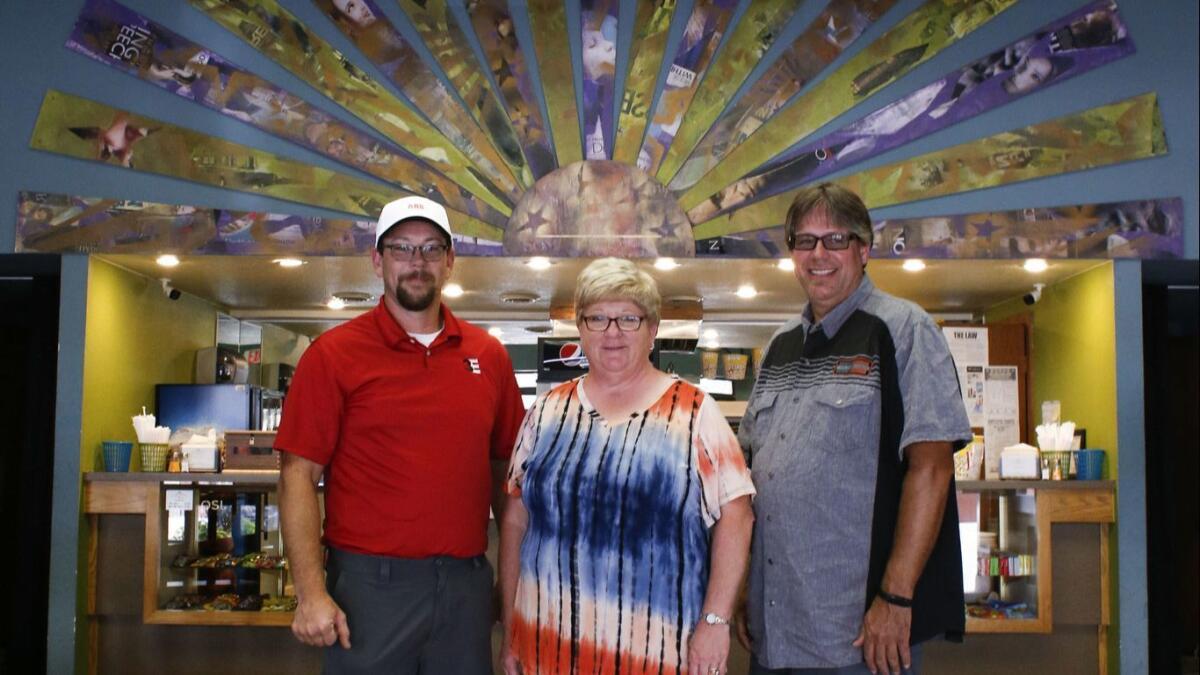
Pingel and Ross didn’t know each other before they met to save the Webster. He walked into her saloon one day and said, “Hey, I heard you’re good at raising money.” She lifted her head from the can catcher and said: “Who are you?” He’s a big man with bangs and dark-rimmed glasses; she has sandy hair, a matter-of-fact sense of humor and says things like, “Bob just kicked in $10,000.” Their sentences glide into one another.
“Remember,” he said, “we had to take the marquee down to its skeleton?”
“The beauty of it had been patched over,” she said.
“They said in the 1960s that TV would kill film, but movies are still here,” he said. “A guy told me, ‘you’ll never be able to pull this off. There’s Netflix and streaming.’ A ton of people said that. They didn’t think it was viable.” He paused, smiled, look at Ross. “Now, we’re considering opening a drive-in.”
On a recent summer night, an evening breeze swept down Second Street. The stores were closed, except for La Perla Jarocha and Chicago Style, where Laura Jaimes would work at least an hour longer. Women and girls – a handful of men – walked to the Webster for the opening of “Mamma Mia! Here We Go Again.”
Manager Aaron Rider sold tickets. A few people brought their own tubs for popcorn. Gemma Borer, a high school cheerleader, stepped in with her father. She had been coming here since she was a little girl. “Netflix and other things are changing things,” she said, “but I think this movie theater will last. You can spend quality time with whoever you’re with. You know people. In this town, you know everyone.”
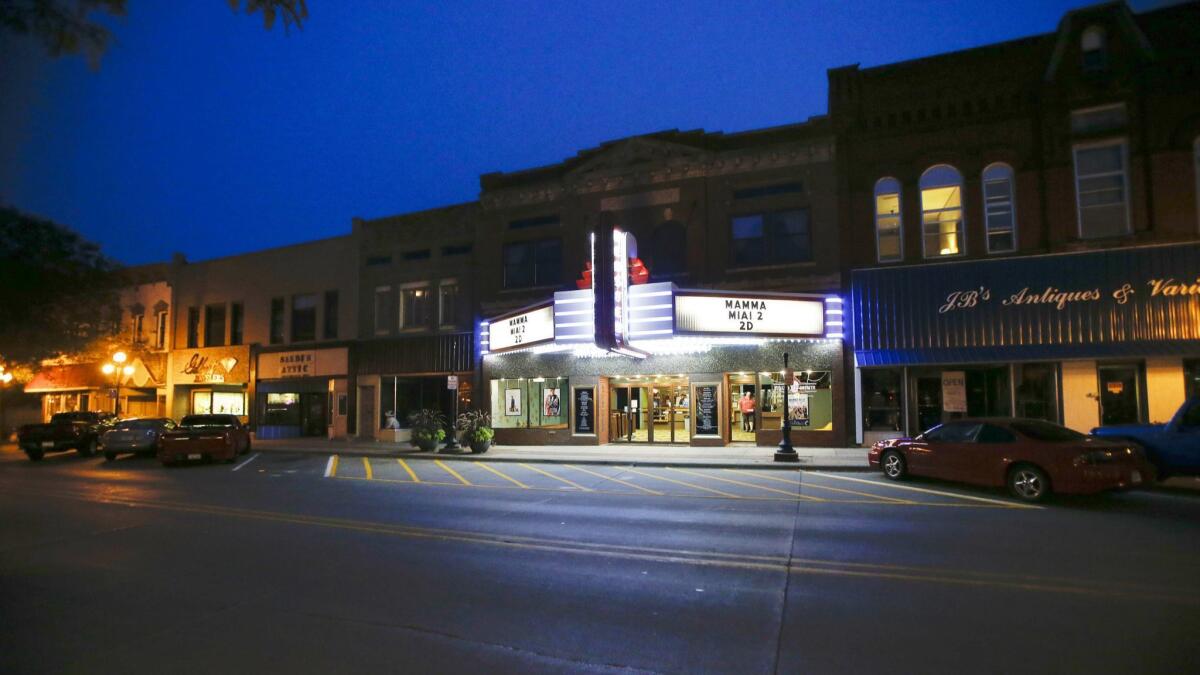
Forty-four tickets were sold. Rider went upstairs — passing a reel-to-reel projector, now a relic — and into a booth with a new digital projector. The theater went dark. The coming attraction was “Mission: Impossible — Fallout.” Tom Cruise jumping out windows. An ad for a Crime Stoppers tip line flashed, another for a Methodist church. “Mamma Mia!,” a musical about a young woman wanting to save a restored hotel in Greece, began.
The credits came up over the last song. The marquee lights shone in the night; the theater looked like it did in the 1930s, a piece of magic beneath a half-moon. Something in a scrapbook, but still somehow alive. Rider turned off the lights and locked the glass door. The breeze picked up. A train could be heard in the distance, where the road cut to Fort Dodge and fields rolled to black.
This is the first in an occasional series about cultural touchstones reflecting the tumultuous political times across America.
See the most-read stories this hour »
Twitter: @JeffreyLAT
ALSO
Rage and wonder in 1968: The year war came through the TV and I felt pieces of childhood ending
More to Read
Only good movies
Get the Indie Focus newsletter, Mark Olsen's weekly guide to the world of cinema.
You may occasionally receive promotional content from the Los Angeles Times.
